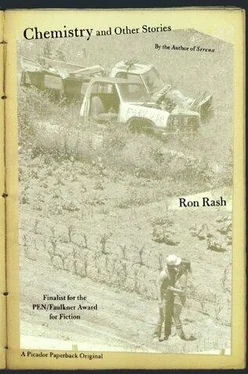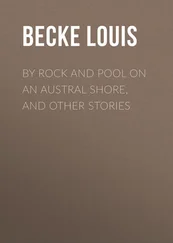Mary said we should fix a picnic lunch and go to Lake Jocassee, take the boat out and eat our lunch on the far shore, where the Horsepasture River enters the lake. I was glad she wanted to leave the house, gladder still she wanted to do something with me. Since the second miscarriage she hadn’t wanted to do much of anything but sit at home on weekends and stare at the television. We’d been more like roommates than husband and wife.
I hadn’t taken the boat out since September, so I checked it good before I hitched the boat trailer onto the car. Mary stayed inside and made our lunch.
We were on the water by ten. Since there was no wind, I cut the motor halfway across and we drifted. We looked down into mountain water so clear it was like peering through a window. After a few minutes we saw what we were looking for. Eighty feet down were farmhouses Duke Power hadn’t bothered to raze when they’d built the dam, and not just houses but barns, woodsheds, even mailboxes. Everything was there but the people.
“It’s like if you watched long enough somebody would walk out of one of those houses and look up and wave at us the same way we’d look up and wave at a plane,” Mary said, and her saying that spooked me, because I’d been thinking the same thing, not the part about the plane but that there were still people down there, people who didn’t know they were buried under eighty feet of water.
I’d moored the boat in the cove where the Horsepasture slowed and lost itself in the lake. We walked a quarter mile through woods that still had patches of snow and spread a quilt in a meadow we’d found years back right after we’d gotten married. It had been cool on the water and in the woods, but here the noon sun poured down on us. The surrounding oaks and poplars seemed to wedge all the sun’s heat into the meadow. A few wildflowers opened their petals. I took off my sweatshirt.
Mary unpacked cheese, apples, a loaf of bread, and a bottle of wine from the picnic basket. I’d been expecting turkey sandwiches and Cokes. Neither one of us had ever been much of a wine drinker, and I almost said something about that but I didn’t. Mary seemed happy, and she hadn’t been happy for a long time.
“Here,” she said, handing me the wine, paper cups, and corkscrew, “make yourself useful.”
In the distance I could hear the last waterfall before the river entered the lake, but I heard nothing else. No boat motors, no squirrels or birds. You could almost have believed there was no world beyond the meadow’s tree line. I handed Mary a cup of wine.
“To the future,” she said and tapped her cup against mine. She took a sip, then placed the cup on the grass and did not drink from it again.
Our appetites were keen. We ate all the bread and cheese and halved an apple. When we finished we put everything back in the basket and lay down on the quilt, drowsy from the food and warmth. I was almost asleep when Mary sat up and unlaced her hiking boots. She took off her sweatshirt. There was nothing, not even a bra, underneath. Mary lay down beside me and took off her jeans and then unbuttoned my shirt. I was surprised because I knew that it was the time of month she was most fertile. Since the second miscarriage she hadn’t let me touch her during this time, even with her diaphragm in. I felt the goose bumps on her arms, so I folded the quilt over us.
“What about your diaphragm?” I asked.
“I want us to try again,” she said and pulled me to her.
We slept afterward. I woke before Mary and listened to her breath merge with the sound of the waterfall. I lay there knowing our future together would come down to this last gamble, because our marriage had barely survived the last miscarriage. If it had survived. I wasn’t sure.
Something happens to a couple after a miscarriage, or at least it had happened to us. You cry together, you talk to the counselor and preacher, you hear the same stupid and callous remarks from friends and kin who should know better, but there’s still a part of the pain you can’t share, even with the person who went through it with you. You carry that pain inside like a tumor, and though it may shrink with time, it never disappears, and it’s malignant.
Shadows had covered us by the time Mary waked. She’d pressed against me and we’d made love again, then walked back into the woods, leaving behind the last rays of sunshine filtering through the trees, the wildflowers that would die in a few days, when the frost returned.
I open my eyes, try to believe Mary’s going to come through the door, smile, and say everything is okay. The woman across the room is still looking at me. She opens her mouth, slow like a rusty hinge. Her forehead creases. She speaks, a mumble of blood and words that I can’t understand.
“No, darling,” her husband says, placing his arm around her. “Don’t try to talk.”
Up the highway toward Westminster I hear an ambulance, the wail increasing as it nears, then silenced as it turns in to the emergency entrance, red light drenching all of us as it passes the glass door Mary and I hurried through an hour ago.
The phone at the reception desk rings.
“Mr. Triplett.” The receptionist motions for me.
I walk over to the window.
“Dr. Walton needs to talk with you. He’s down the corridor, second room on the right.”
Her voice is muffled by the glass. She points at the door as if we are in a place where we can communicate only in gestures.
I look back at the woman with the battered face. Her brown eyes hold mine for a moment. She nods, and I want to believe that both our lives might somehow turn out better than either of us can believe at this moment. Not tomorrow or next week, just sometime. I take a deep breath and walk through the door that says DO NOT ENTER and down the corridor. I walk slow as the dead might walk across the cold and silent floor of Lake Jocassee.
Luther comes up to me right before quitting time. He wants to go over to Holly Oak Park in Shelby and play some ball. I’m thinking how dog tired I am now and how much tireder I’ll be tomorrow if I play. But it is Thursday. You can always get through Friday, no matter how tired, sick, or hungover you are. It’s like getting to the fourth quarter and knowing you just got to gut it out a little longer.
“What time you want me to pick you up?” I ask. His old lady works the suicide shift at the 7-Eleven, so she’ll have the car.
“Seven,” he says. “I’ll get us a six-pack for after.”
“You don’t have to do that,” I say, but I know he does. He’s too proud to just bum a ride, especially from a white guy.
We walk to the trailer to clock out, moving slow to make sure it’s not a second before five o’clock when we get there. Luther gets his card and punches it. His hands and arms are no more black than mine are white. Since we mix mortar all day, we’re mostly gray from the shirtsleeves down, like a new race of people.
Luther walks on out to where the hourly workers park, and I follow him. Even from the back you can tell he’s still in shape. No spare tire. Still wiry strong. When he played safety in high school, he was only five-eight and 135 pounds, but man could he hit. In the Burns game my senior year, their fullback ran right by me and everybody else on the line. Our linebackers were blitzing, so it was just Luther and this two-hundred-pound fullback who wasn’t even going to try to run around Luther, just plow right through him. They had to carry that son of a bitch off the field on a stretcher. Luther cracked three of his ribs. That guy spent the rest of the game on the bench, moaning and spitting up blood.
I GET TO Luther’s place right at seven. It’s not much, a double-wide, a few scraggly-assed pine trees, and a lot of red dirt for a front yard. But unlike me he at least owns his place. That’s something. An old woman peeks through the curtains. Luther’s five-year-old comes out, runs up to my window.
Читать дальше












